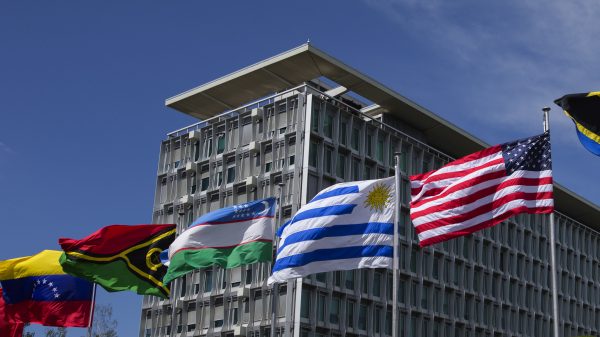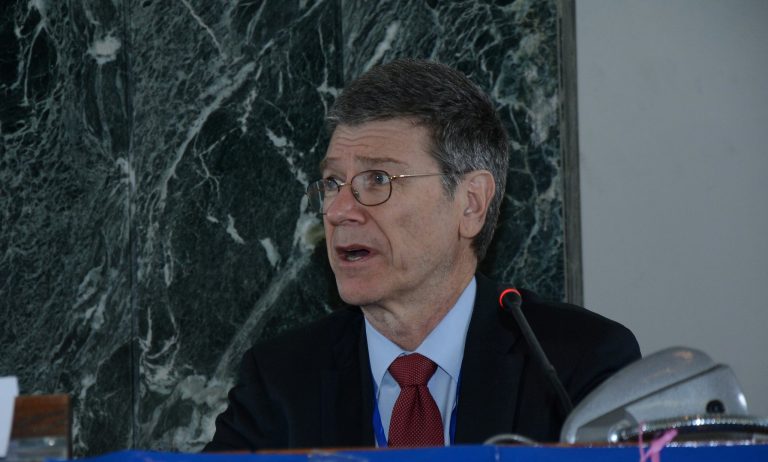Jeffrey Sachs, chairman of medical journal Lancet’s Coronavirus Disease 2019 (COVID-19) Commission, has extensive ties to organizations associated with the Chinese Communist Party (CCP), including China-United States Exchange Foundation (CUSEF), the China Energy Fund Committee (CEFC), and Huawei, according to The National Pulse.
The commission has four main objectives – (1) recommending the best ways to suppress the pandemic, (2) addressing the humanitarian crisis triggered by the viral outbreak, (3) dealing with the economic and financial fallout of the pandemic, and (4) aiding in rebuilding a fair, inclusive, and sustainable world. Sachs’ eminent role enables him to oversee COVID-19 investigations and make recommendations that may be implemented globally.
In 2020, Sachs appeared in a show backed by CUSEF, a propaganda group founded by a former CCP member who serves as the Vice-Chairman of an entity overseeing the activities of China’s United Work Front. As a guest speaker on the show’s podcast in May 2020, Sachs criticized the Trump administration for taking a hardline position against the communist regime.
“The U.S. right-wing was attacking China beforehand and the Trump administration had its so-called trade war against China and then its technology war against China. I regarded those as dangerous, wrong, absurd, on false pretenses… Trump was in the middle of confronting China, and I think very dangerously so and I opposed it all along,” Sachs said on the podcast.
Sachs also has ties to CEFC, whose Chairman, Patrick Ho, was one of Hunter Biden’s business partners. The U.S. Justice Department indicted Ho in 2018 for “two bribery schemes to pay top officials of Chad and Uganda in exchange for business advantages for CEFC China.” Sachs has been on CEFC’s 2015 Advisory Council and has participated in CEFC-backed events such as the Sino-US Colloquium.
Success
You are now signed up for our newsletter
Success
Check your email to complete sign up
In addition, Sachs has publicly praised Huawei, a company that the Trump administration labeled as a national security threat due to its collaboration with the Chinese military. In an article that details the firm’s plans to dominate the global 5G sector, Sachs calls Huawei a “remarkable company.” In another op-ed, he laments that America has declared “war on Huawei.”
Critics worry that Sachs’ soft position against China betrays American interests. He is quoted heavily by foreign media outlets such as state-backed China Daily and Xinhua, which cite his comments as a “Western expert” to validate the policies of the communist regime while simultaneously pointing out the flaws of Western nations.
WHO’s coronavirus origin study ‘lacks crucial data’
The CCP’s influence not only reaches key international figures such as Sachs, but also includes global organizations that are meant to enforce regulations in an unbiased manner. For example, the recent World Health Organization (WHO) coronavirus origin study published on March 30 met with public backlash due to its questionable methodology.

The team conducting the investigation spent four weeks in the communist nation in January and February. However, the team was barred from spending time at critical sites and was only given secondhand data rather than being allowed to investigate on their own. As a result, the final report indirectly reflected the regime’s viewpoints and propaganda rather than providing an unbiased, scientific report.
In total, 14 nations raised concerns about the investigation, including the United States, Australia, Japan, South Korea, and the UK. White House press secretary Jen Psaki said on March 30 that the WHO report “lacks crucial data, information, and access. It represents a partial and incomplete picture.”
“There’s a second stage in this process that we believe should be led by international and independent experts. They should have unfettered access to data. They should be able to ask questions of people who are on the ground at this point in time, and that’s a step the WHO could take,” she said in a statement.
Chinese vaccination efforts fall short
Meanwhile, China is facing trouble with its COVID-19 vaccination drive. The Chinese government had set a target of vaccinating around 560 million people, or 40 percent of its total population, by the end of June. As of April 11, only 167.3 million doses have been administered.
One major reason citizens have avoided the jab is because the Chinese-made vaccines have low efficacy rates of around 50 to 80 percent, considerably less than the approximately 95 percent efficacy rates of the Pfizer-BioNTech and Moderna vaccines. The Brazilian trial for the Chinese-made CoronaVac vaccine revealed an efficacy rate of just 50.4 percent, barely above the 50 percent threshold mandated by the WHO.
At a recent press conference, Gao Fu, head of the Chinese Centres for Disease Control and Prevention (China CDC), admitted that the current Chinese vaccines do not have very high rates of protection, and even suggested mixing vaccines to boost their efficacy.
“The protection rates of all vaccines in the world are sometimes high, and sometimes low. How to improve their efficacy is a question that needs to be considered by scientists around the world… In this regard, adjusting the vaccination process in terms of the number of doses and intervals and considering sequential inoculation of different types of vaccines might be possible options,” Gao said to Global Times.
The CCP has resorted to threatening people with serious consequences if they do not get vaccinated. For example, some local governments have encouraged businesses to fire employees who refuse to get the jab. Many Chinese citizens denounce these methods of coercion and question the safety of vaccines offered by the regime.
















